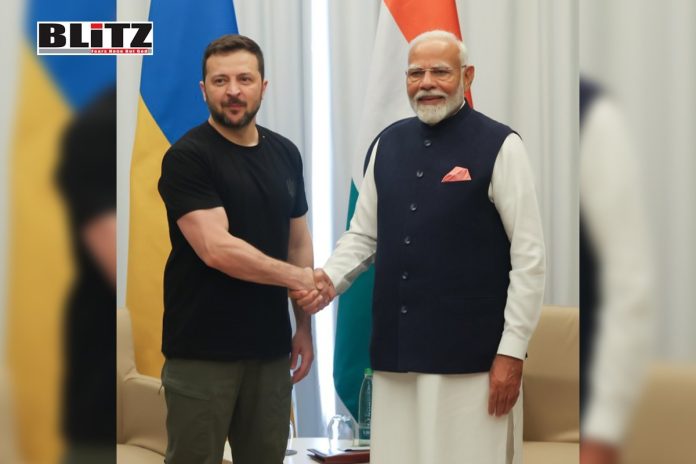Indian Prime Minister Narendra Modi and Ukrainian President Volodymyr Zelensky held a “productive assembly” on the sidelines of the G7 summit in Italy. This bilateral assembly, which included distinguished Indian officers akin to Exterior Affairs Minister S. Jaishankar, Overseas Secretary Vinay Kwatra, and Nationwide Safety Advisor Ajit Doval, centered on the continued battle in Ukraine and the broader implications for international stability.
Prime Minister Modi expressed India’s eagerness to cement its bilateral relations with Ukraine, highlighting the mutual advantages of strengthened ties. In a publish on X (previously referred to as Twitter), Modi emphasised that India believes in a human-centric strategy to resolving conflicts, advocating for peace by way of dialogue and diplomacy. This stance underscores India’s longstanding diplomatic philosophy of in search of peaceable resolutions to worldwide disputes and enhancing bilateral cooperation.
Because the escalation of hostilities between Russia and Ukraine in early 2022, India has maintained a balanced and nuanced place. New Delhi has continued to develop its ties with Western nations whereas preserving its strategic partnership with Moscow. This delicate balancing act has allowed India to ramp up its energy-resource procurement from Russia, regardless of dealing with scrutiny from Washington and Brussels.
India’s overseas affairs ministry spokesperson, Randhir Jaiswal, reiterated the nation’s dedication to a peaceable decision of the battle. “The PM conveyed that India continues to encourage peaceable decision of the battle by way of dialogue and diplomacy,” he posted on X. This balanced strategy displays India’s broader overseas coverage goals of fostering international peace and stability whereas defending its nationwide pursuits.
Addressing an outreach session on the G7 summit, Modi emphasised the disproportionate impression of world uncertainties and tensions on the international locations of the International South. He highlighted India’s dedication to bringing the priorities and issues of those nations to the world stage. This advocacy aligns with India’s historic position as a pacesetter of the Non-Aligned Motion and its continued efforts to characterize the pursuits of growing international locations in international boards.
India’s participation within the upcoming Swiss-hosted peace talks on Ukraine, introduced not too long ago, marks a major step in its diplomatic efforts to mediate the battle. Zelensky expressed gratitude for India’s involvement, thanking Modi for sending a “high-level” delegation. Kiev has been eager on securing Modi’s private participation within the peace convention, which notably excludes Russia.
Ukrainian Overseas Minister Dmitry Kuleba’s go to to Delhi in March was a part of Kiev’s broader technique to garner worldwide help for its ‘peace system’ for the battle. Throughout his go to, Kuleba emphasised that Ukraine-India relations have a promising future, contrasting them with what he described as India’s “extinct” Soviet legacy with Russia. He advised that India’s shut ties with Moscow could possibly be leveraged to affect Russian conduct positively.
Regardless of Kiev’s efforts to sway New Delhi, India’s relationship with Russia stays strong and deeply rooted in historical past. Indian Overseas Minister S. Jaishankar has underscored the “time-tested” nature of this relationship, noting that each nations take “additional care” to take care of one another’s pursuits. This enduring partnership has been mirrored within the surge of bilateral commerce, which reached $65 billion final yr, largely pushed by India’s imports of Russian oil.
India’s strategy to the Russia-Ukraine battle is reflective of its broader diplomatic technique, which prioritizes strategic autonomy and balanced worldwide relations. By partaking with each Western powers and Russia, India seeks to keep up its non-aligned stance whereas advancing its nationwide pursuits. This technique permits India to behave as a possible mediator in worldwide conflicts, leveraging its distinctive place to advocate for peaceable resolutions.
The assembly between Narendra Modi and Volodymyr Zelensky on the G7 summit underscores India’s proactive position in in search of a peaceable decision to the Ukraine battle. By advocating for dialogue and diplomacy, India goals to contribute to international stability whereas strengthening its bilateral relations with Ukraine. On the similar time, New Delhi’s balanced strategy to its relationship with Russia highlights its dedication to sustaining strategic autonomy in its overseas coverage.
Because the world appears in the direction of the Swiss-hosted peace talks, India’s involvement can be carefully watched. New Delhi’s skill to navigate the complicated geopolitical panorama and act as a mediator might show pivotal within the quest for peace in Ukraine. By way of its engagement, India reaffirms its dedication to international peace and its position as a accountable worldwide actor dedicated to the rules of dialogue and diplomacy. This multifaceted strategy not solely enhances India’s international standing but additionally contributes to a extra secure and peaceable worldwide order.
👇Comply with extra 👇
👉 bdphone.com
👉 ultraactivation.com
👉 trainingreferral.com
👉 shaplafood.com
👉 bangladeshi.assist
👉 www.forexdhaka.com
👉 uncommunication.com
👉 ultra-sim.com
👉 forexdhaka.com
👉 ultrafxfund.com
👉 ultractivation.com
👉 bdphoneonline.com


